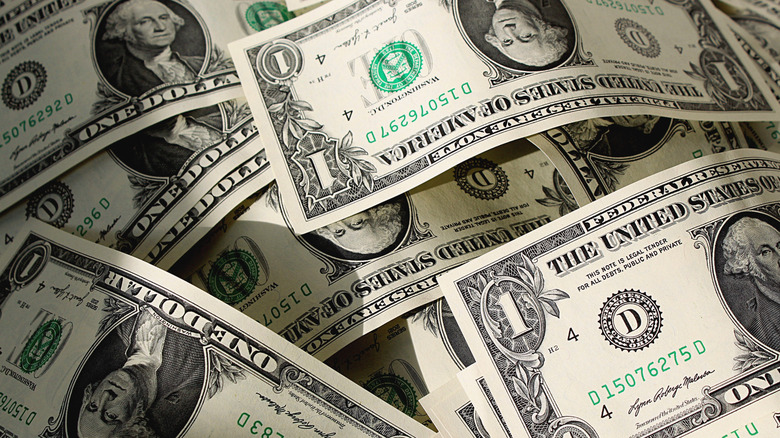If You Save $1 Every Day From The Day You Were Born, Here's How Much Money You'd Have
When it comes to saving money, there are an almost endless amount of strategies to choose from. This might lead you to wonder if taking a smaller approach would actually be easier. For example, what if you chose to save $1 every day, rather than spending time on more convoluted investment strategies or never-ending 401(k) vs. Roth IRA debates. Saving a dollar for every day going back to the day you were born might seem like an easy enough way to ensure a considerable nest egg. However, while the answer of just how much money that would be might seem as simple as adding up every day until your current age to determine the answer, the reality involves a bit more calculation than that.
Ultimately, the value of a dollar is not as solid as many might assume. A 50-year-old who has saved $1 every day since birth, would end up with $18,250. While that is not nothing, it's hardly enough to retire. Plus, it's worth considering how much more that money was worth 20 or even 30 years ago. For example, if we assume this same person's savings strategy but move back 25 years, then they would have saved roughly $9,125 by the year 2000. According to inflation calculators, that $9,125 would have actually been the equivalent of $17,111.68 in 2000 –- almost as much as 50 years worth of saving, but in half the time. Interest and purchasing power are ultimately at the heart of why this savings strategy might not be the best approach.
Understanding purchasing power
When it comes to consumer purchasing power, it's important to understand that this power boils down to the amount of products or services you can buy with a single unit of money. In other terms, purchasing power reflects real-world and ever-changing currency values in the marketplace. However, perhaps purchasing power's greatest enemy is inflation, which can and does weaken currency values — especially over long periods of time. The post-pandemic economy serves as a particularly good example of how consumer money simply doesn't go as far as it did pre-pandemic. For example, the fact that U.S. food prices increased 23.6% from 2020 to 2024, per the U.S. Department of Agriculture's Economic Research Service. This means that the same $100 that a household had available to spend on groceries every week now leaves them able to afford almost a quarter fewer products than before.
This is why it is not enough to simply save money under your mattress, or even in a standard savings account. As inflation increases, the value of your saved money will ultimately shrink. This is also why it can be particularly important to consider specific savings strategies to combat inflation – such as placing your money into high annual yield (APY) percentage savings accounts, a long-term certificate of deposit (CD), or even a money market account. Essentially, ensuring your money earns at least the same amount as current inflation rates, if not more, can ensure you keep your purchasing power and the worth of your own money long term.
Best options for long-term savings
While there is a lot to be said for taking advantage of your workplace's 401(k) options, especially if they offer matching, those who might work freelance or as proprietors of their own small businesses might not necessarily have access to these kinds of long-term retirement savings plans. Plus, for those looking for more flexibility in their savings, pursuing high APY savings accounts, CDs, and MMAs can offer inflation-combating interest with the flexibility of still being able to access your money.
For starters, it's important to realize that most high-APY savings accounts will be offered through online-only banks as opposed to more traditional brick-and-mortar banks. This means that this option is best suited to those who don't need or want a physical location to visit — something that can be a deal breaker for some consumers. When considering a CD, it's important to think through just how long you want your money to be tied up. Since CD's have a pre-determined length of time in which your money is inaccessible to you, you might want to think twice about using a longer term CD. However, having a locked in interest rate for an extended period could be helpful depending on the state of the economy. Another option is to consider a money market account (MMA), which is essentially another kind of savings account that limits the number of transfers and purchases made on the account. While offering similar interest as high-APY savings accounts, MMA's tend to offer check writing and debit cards making it easier to access.


